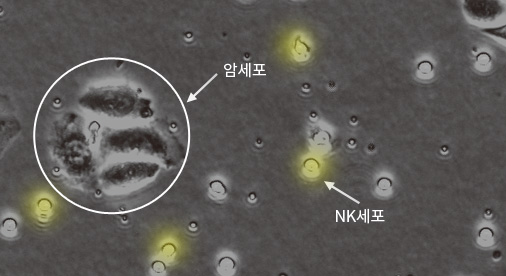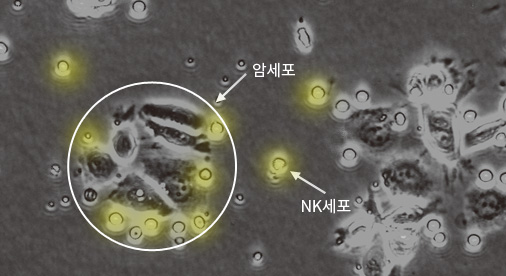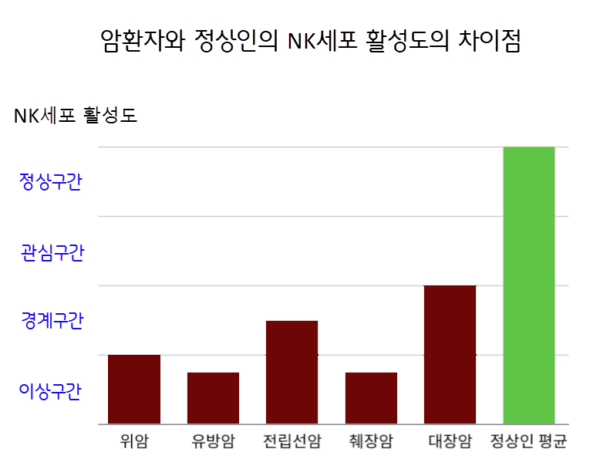NK Cell Activity Test in Korea
Your health guardian is your immune system
Procedure Process Explanation
What are NK cells?
Natural Killer cells (NK cells) are called “natural killer cells” because they directly attack and eliminate abnormal cells such as cancer cells or virus-infected cells.
Unlike normal cells, virus-infected or cancer cells show a reduction of certain proteins on their surface. NK cells, which travel through the bloodstream, identify these abnormal cells, break down their cell membranes, and inject proteolytic enzymes to destroy them.
Every day, approximately 5,000 cancer cells arise in the human body, and NK cells work to attack and remove these cells. However, cancer can still develop because individuals differ in both the number and activity level of their NK cells.
Cancer patients typically have significantly lower NK cell activity than healthy individuals, reducing their ability to eliminate cancer cells. Therefore, it is important to check and manage immune function through NK cell activity testing.
NK cell activity has a greater impact on immunity than NK cell count
Since the 1980s, research on NK cells’ immune functions initially focused on the number of NK cells. However, recent studies have shown that NK cell activity plays a much bigger role in immune strength than their quantity, leading to active research on the connection between NK cell activity and various diseases.


Immune cells in our body
Our body has a powerful defense system that protects us from harm—this system is known as the immune system. When immunity is weakened, the body becomes more prone to persistent inflammation, frequent minor illnesses like colds, and an increased risk of serious diseases such as cancer.
While maintaining a healthy diet, regular exercise, and managing stress are all important, regular monitoring of NK (Natural Killer) cell activity is also necessary as a preventive measure to assess immune health in advance.
Here are some of the key immune cells and their roles that are helpful to know in this process:
NK Cells
Attack and destroy abnormal cells, such as cancer cells or virus-infected cells, without prior sensitization.
T Cells
Regulate immune responses and directly kill infected or cancerous cells.
B Cells
Produce antibodies that help identify and neutralize pathogens.
Macrophages
Engulf and digest foreign substances, dead cells, and other debris in the body.
Benefits of an NK Cell Activity Test:
The NK cell activity test involves drawing a blood sample to determine the number of NK cells and then artificially stimulating them to measure the amount of interferon-gamma (IFN-γ) they secrete. This value is presented as a numerical score, allowing an assessment of the body’s resistance to cancer and other diseases.
Who We Recommend NK Cell Activity Test To:
The normal range of NK cell activity is above 500. If your NK cell activity is significantly low, below 100, it is recommended to undergo cancer screening.
This test is especially recommended for:
Check your body’s immunity with an NK cell activity test
Interpretation of NK cell activity test
The NK Cell Activity Test is not a diagnostic test for cancer. Rather, it is used to evaluate the functionality of the immune system, particularly how active your Natural Killer (NK) cells are.
- High activity : High NK cell activity can be interpreted as a sign that the immune system is working well.
- Low activity : If your activity is low, you may have a weakened immune system, making you susceptible to infection or disease.
If your NK cell activity is significantly lower than the normal range, it is essential to consult with a medical specialist for a thorough evaluation.
Even if further diagnostic tests do not reveal a serious illness, persistently low NK cell activity suggests that your anti-cancer immune function may be considerably weaker than that of the general population.

Normal range (over 500)
- Meaning: NK cell activity is within the normal range, indicating optimal immune function.
- Recommendation: It is advisable to monitor immune health with this test approximately once a year to maintain your current immune status.
Interest range (250~500 or less)
- Meaning: Although within the normal range and not directly associated with disease, this result indicates a weakened immune system.
- Recommendation: Engage in activities that boost immunity and undergo regular testing every 3 to 6 months.
Borderline (100~250 or less)
- Meaning: The NK cell activity is lower than normal, which may indicate an early sign of illness or a temporary decrease in immune function due to stress or sleep disturbances.
- Recommendation: If there are no factors like stress or sleep disorders affecting the test results, it is advisable to retest after 2 to 4 weeks.
Ideal range (less than 100)
- Meaning: NK cell activity is very low, which may indicate the presence of a disease.
- Recommendation: If there are no factors such as stress or sleep disturbances affecting the test, it is recommended to retest after 2 to 4 weeks. If the activity remains consistently low, it is highly associated with serious conditions like cancer, so consulting a specialist is advised.
